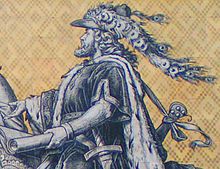Henry III. (Meissen)

Henry III. , called the illustrious (* around 1215 in Meißen ? † February 15, 1288 in Dresden ) had been Heinrich III since 1221. Margrave of Meissen and as Heinrich IV. Margrave of Lausitz , Landgrave of Thuringia and Palatine of Saxony from the House of Wettin .
Life
Heinrich was born around 1215 as the youngest son of Dietrich the distressed and Jutta von Thuringia . In 1221 he followed his father, who was the Wettin Margrave of Meissen , under the tutelage of his uncle, Landgrave Ludwig (the Holy) of Thuringia , and after his death in 1227 under the tutelage of Duke Albrecht I of Saxony .
As early as 1230 he was declared of age and in 1234 with Constanze , the daughter of Duke Leopold VI. of Austria , married. With her he had two sons Albrecht (1240–1314 / 15) and Dietrich (1242–1285).
Heinrich experienced his first campaign in 1237 in the crusade against the Prussians (unsuccessful siege of Balga Castle ) and soon got caught up with the ruling Ascanian Margraves of Brandenburg, Johann I and Otto III. , in feud . Heinrich ultimately failed with the intention of advancing east of Lower Lusatia past Berlin into the area that was still free of domination. In 1245, after the six-year Teltow War, he had to cede his two dominant centers on the Teltow , Köpenick and Mittenwalde to the Mark Brandenburg . His attempt to set up a small lordship on the Barnim around Hönow was also over after this war. At the same time, however, he won the Schiedlo area , where he founded Fürstenberg (Oder) . In 1268 Heinrich donated the Neuzelle monastery .
In the struggle between the emperor and the pope , Heinrich took the side of the emperor with determination. In gratitude for this, Friedrich II granted him a contingent mortgage in 1242 with Thuringia and the Palatinate Saxony and in 1243 betrothed his daughter Margaretha to Heinrich's son Albrecht .
Only after Conrad IV withdrew from Germany did Heinrich recognize the opposing king, Wilhelm of Holland . After Heinrich Raspe's death in 1247, he was only able to assert his claim to Thuringia with a sword against Sophie von Brabant , daughter of Louis the Holy and wife of Duke Heinrich II of Lorraine and Brabant, and Count Siegfried von Anhalt. After a protracted war, the so-called Thuringian-Hessian War of Succession , he was forced to cede the Hessian parts of the country to Sophie's son Heinrich I of Hesse (also called "Heinrich the Child"). He still had Thuringia, which he submitted to his son Albrecht , and the Palatinate Saxony . These acquisitions enlarged the Wettin land holdings, which now stretched from the Oder to the Werra , from the Ore Mountains to the Harz Mountains .

Only domestic quarrels, caused by the unworthiness of his son, Albrecht the Degenerate, clouded the later years of his reign and shattered his house long after his death in 1288.
Heinrich was a brave, noble, just, art-loving, generous and splendor-loving prince (Henricus illustris) . In his second marriage, after Constanze's death († 1243) , he was married to Agnes of Böhmen († October 10, 1268) from 1244 or 1245 . His third marriage was between 1268 and 1273 with the ministerial daughter Elisabeth von Maltitz (1238 / 39-1333), who gave birth to Friedrich Clem (1273-1316) and Hermann the Long .
Heinrich appears as a minstrel in the Great Heidelberger Liederhandschrift ( Codex Manesse ) ; one page of the manuscript (14v) is dedicated to a picture of him, then two pages (15r & 15v) to his poems. In literary studies he is often referred to simply as Heinrich von Meißen ; this designation is also used for Heinrich Frauenlob , which can easily lead to confusion, especially since Frauenlob's songs have come down to us in the same handwriting.
literature
- Heinrich Theodor Flathe : Heinrich III., Margrave of Meissen . In: Allgemeine Deutsche Biographie (ADB). Volume 11, Duncker & Humblot, Leipzig 1880, pp. 544-546.
- Herbert Helbig : Heinrich III. the illustrious one. In: New German Biography (NDB). Volume 8, Duncker & Humblot, Berlin 1969, ISBN 3-428-00189-3 , p. 373 ( digitized version ).
- Wolf Rudolf Lutz: Heinrich the Illustrious (1218-1288). Margrave of Meissen and the Ostmark (1221–1288), Landgrave of Thuringia and Palatine of Saxony (1247–1263) (= Erlanger Studies. 17). Palm and Enke, Erlangen 1977, ISBN 3-7896-0117-9 (also: Erlangen-Nürnberg, dissertation, 1976).
- Jörg Rogge : The Wettins. Rise of a dynasty in the Middle Ages. Thorbecke, Ostfildern 2005, ISBN 3-7995-0151-7 .
- Friedrich Wilhelm Tittmann : History of Heinrich the illustrious, Margrave of Meissen and in the Easter country, and representation of the conditions in his countries. 2 volumes. Arnold, Dresden et al. 1845–1846, ( digitized volume 1 ; digitized volume 2 ).
Web links
- Heinrich (the illustrious) in the Saxon biography
- Literature by and about Heinrich III. in the Saxon Bibliography
| predecessor | Office | successor |
|---|---|---|
| Heinrich Raspe |
Count Palatine of Saxony 1247–1288 |
Albrecht II. |
| Heinrich Raspe |
Landgrave of Thuringia 1247–1265 |
Albrecht II. |
| Lockpick |
Margrave of Meissen 1221–1288 |
Albrecht II. |
| Lockpick |
Margrave of Lusatia 1221–1288 |
Friedrich the Stammler |
| personal data | |
|---|---|
| SURNAME | Henry III. |
| ALTERNATIVE NAMES | Henry the Illustrious |
| BRIEF DESCRIPTION | Margrave of Meissen from the house of the Wettins |
| DATE OF BIRTH | around 1215 |
| PLACE OF BIRTH | unsure: Meissen |
| DATE OF DEATH | February 15, 1288 |
| Place of death | Dresden |
